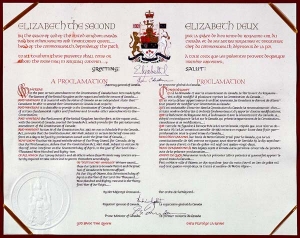
An immigrant from Utar Pradesh reading the constitution of Canada would learn about a country ruled by an all powerful monarch counselled by a popular assembly of the common people. A country with a very primitive form of democracy and scarcely a check or balance.
Such is the British parliamentary system. A system that evolves slowly with time and who’s foundations are made of traditions instead of words.
The idea that the leader of the party that wins the most votes in the election becomes Prime Minister and he forms a government out of elected members of his own party is not in the constitution. You can ctrl+f the constitution all you want, you won’t find the words “political party” in there.
Political parties were a sort of spontaneous formations - kind of like the alliances in the TV show Survivor - that were never intended by the designers of the game, but became a fundamental part of it nonetheless. The original intent was that any combination of elected (white males who owned land in the original version) members of parliament could get together to form, or support, a government.
That is the government’s only claim to legitimacy vis-à-vis the governor and the Queen: it has the support of a majority of the elected members of the House. According to the letter of the law - if you are to read the actual words of the constitution - the Governor General, and ultimately the Queen, can make her cat Minister of Finance.
In 1999 the British kicked the hereditary lords out of their own house, the House of Lords, ending the centuries old right of blue bloods to oversee the Empires affairs without so much as a vigorous debate. Such is the beauty of the British political system: it can turn revolutions into incredibly boring affairs.
Real power slowly but inevitably is transfered from the Throne, to the Parliament, to the democratically elected members of the House. Without any drama or bloodshed. That is how Britain can have one of the most democratic regimes in the world without having to get rid of it’s hereditary head of state. It is how it can have one of the oldest and most stable political systems in the world, without even having a written constitution.
Change is slow, but it moves in one direction: toward more democracy and accountability.
It works because all the players: the Queen, the governors, the MPs, the Senators, the Lords, the Judges, etc… agree on a few unwritten rules: the House of Commons and it’s elected members hold, not the ultimate legal power, but the only legitimate power and the government must have the support of the House.
Last week the Governor-General of Canada prorogued the session of Parliament to keep a government that it knew did not have the confidence of the majority of the elected members of the House of Commons from losing a vote.
The unelected representative of the Queen disregarded the opinion of the House.
Last week was awesome for Call-centre workers (i.e. Poli Sci majors) across Canada and Québec. We had excitement, drama and intrigue in Parliament. We saw our Head of State act like a Head of State and use her constitutional powers.
That, in our system, is not a good sign for democracy.
